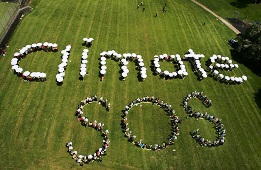 It has been a prickly year for China-India ties with the Arunachal Pradesh boundary dispute poisoning bilateral rhetoric. In Copenhagen, Hindi-Chini Bhai Bhai is back in vogue with the two sides holding meetings up to six times a day, according to Environment Minister Jairam Ramesh.
It has been a prickly year for China-India ties with the Arunachal Pradesh boundary dispute poisoning bilateral rhetoric. In Copenhagen, Hindi-Chini Bhai Bhai is back in vogue with the two sides holding meetings up to six times a day, according to Environment Minister Jairam Ramesh.
India and China are both part of the BASIC (Brazil, South Africa, India and China) group of countries that have decided to coordinate their negotiating stance at the UN climate talks. Interestingly, it is the Chinese who have clearly taken the lead of this group, calling for meetings and constantly updating its members of developments.
For Ramesh, even in the event of a failure of the talks to produce any substantial outcome, the one takeaway from Copenhagen is a reinvigorated India-China dynamics with lasting implications going ahead. "BASIC is a reality now. And, India and China in particular have cooperated and collaborated each word at every step," said Ramesh on Thursday.
Prime Minister Manmohan Singh will meet Chinese Premier Wen Jiabao on Thursday morning, one of the few bilateral meetings he has scheduled.
Jairam Ramesh added that India should learn from the Chinese strategy to fight global warming. "Chinese negotiators talk tough but they also act aggressively domestically to fight climate change," he said. The minister made a case for India matching China's 'ambitious, aggressive domestic agenda' on global warming.
India would perhaps do best to emulate China cautiously. It is China, not India that has emerged at Copenhagen as the preferred scapegoat for developed countries to hang the blame of failure on.
Both United States and the European Union have repeatedly said they do not believe China to be an appropriate spokesperson for the 'developing' world, given its economic clout and recent spectacular growth.
It is China's reluctance to accept more stringent verification of its voluntary domestic mitigation actions that has been singled out by the US as a crucial sticking point.
For China, the benefits of Indian support are obvious. Without it Beijing would find itself completely isolated at the talks.
India should keep in mind that despite having similar list of non-negotiables at the UN meeting, the two countries have a large gulf when it comes to both their per capita as well as aggregate levels of carbon emissions.
China emits four and half times more CO2 than India on a per capita basis and their development needs are also vastly different. It may be fashionable to hyphenate the two, but the cold fact is that China's per capita GDP at close to $5,000 on purchasing parity terms is double of India's $2560.
Jairam Ramesh is walking a fine line in Copenhagen. On the one hand he has wholeheartedly thrown India's lot in with China. On the other, he has also been quick to capitalise on the divergent perceptions of the two countries claiming that he has kept India "out of the firing line" that Beijing is directly in.
This is a strategy that appears expedient during the UN talks, whose long term efficacy may be dubious.










 © 2025 Rediff.com -
© 2025 Rediff.com -